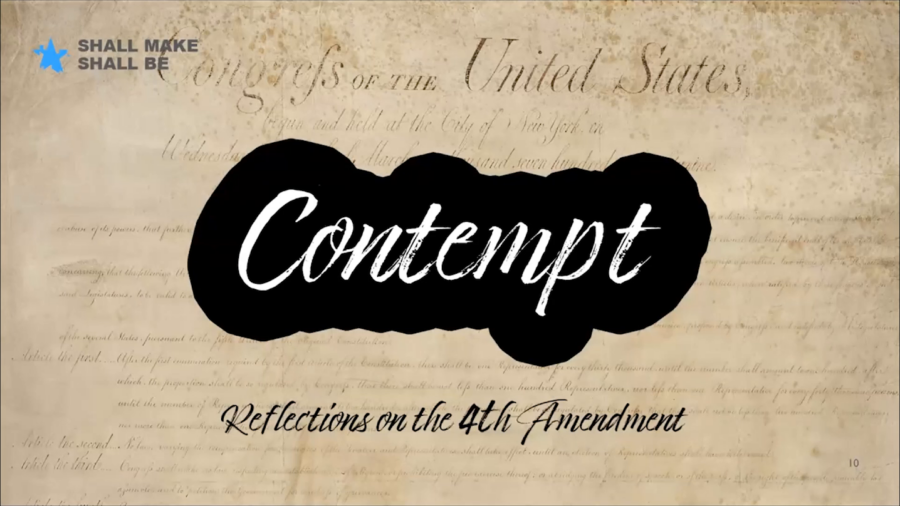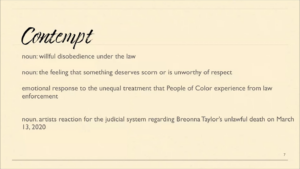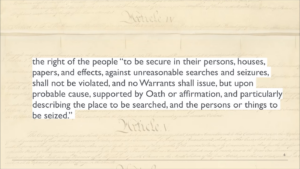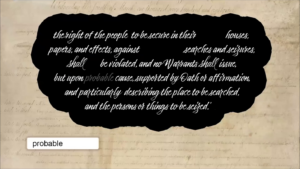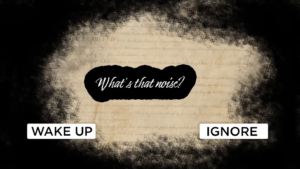Golan Levin: Welcome back to Shall Make, Shall Be. Our next speakers, whose project deals with the Fourth Amendment, are Latoya Peterson and Cherisse Datu, both game designers who started their careers in journalism.
Latoya Peterson lives at the intersection of emerging technology and culture. She’s currently cofounder and CXO and Glow Up Games, a game studio working on their first title set in the world of HBO’s Insecure. Previously, she was the Deputy Editor, Digital Innovation for ESPN’s The Undefeated, an Editor-at-Large at Fusion, and the Senior Digital Producer for The Stream, a social media-driven news show on Al Jazeera America. In 2018, she soft launched AI in the Trap, a collaborative art project that explores the future of artificial intelligence and predictive policing through a hip-hop lens. She is currently on the advisory board of the Data & Society Institute, and the board of visitors for The John S. Knight Journalism Fellowships. She is a US-Japan Leadership Foundation Fellow, a USC Civic Media Senior Fellow, and part of the selection committee for the Museum of Play’s World Video Game Hall of Fame.
Cherisse Datu was raised on the island of Guam. A first-generation Filipino American, she was born to Kapangpangan parents who despite not playing games themselves fostered her love for them—perhaps because her Game Boy kept her quiet during long car rides. Cherisse is currently a video producer at Bethesda Softworks. She previously worked in video at ESPN’s The Undefeated and Al Jazeera’s The Stream. Datu received her Masters in Game Design and her Bachelor’s in Film and Media Arts from American University. A video producer with a background in broadcast news editing and digital entertainment, she finds comfort in creating small forms of playable art to help process current events.
Folks, I’m pleased to welcome Cherisse Datu and Latoya Peterson. Hey folks.
Cherisse Datu: Hi!
Latoya Peterson: Hello, how are you?
Levin: Lovely.
Datu: Where do we start?
Peterson: Yes. Want to take it away from the slide deck?
Datu: Yes! I got you. Hi, everyone. Thank you for joining us. Can you see my screen?
Levin: Not yet.
Datu: Not yet. Okay. Great. That would have been really embarrassing if I started talking and you did not see my screen. One moment.
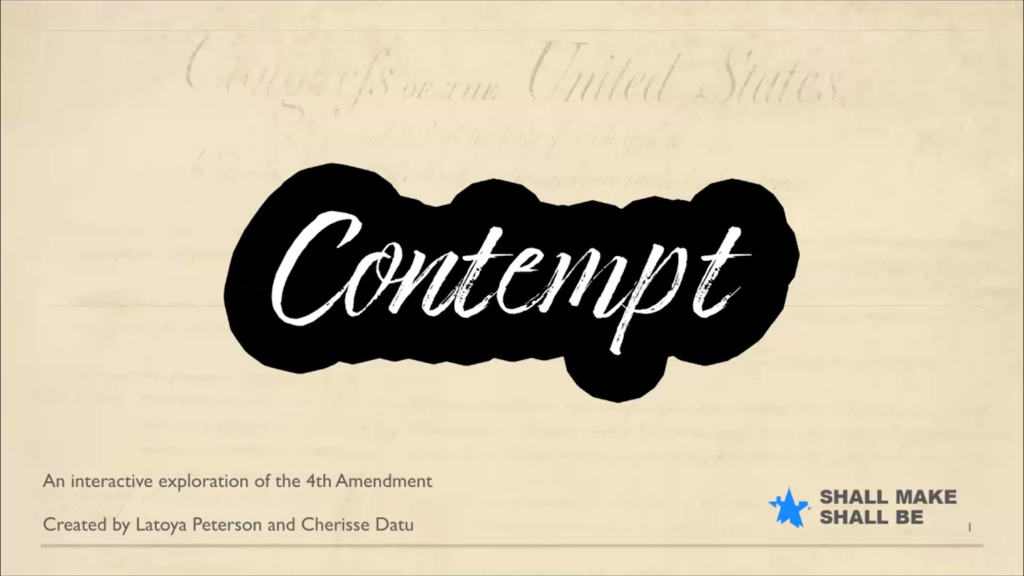
So today we’d like to talk to you about Contempt. And that is what we are calling an interactive exploration of the Fourth Amendment.
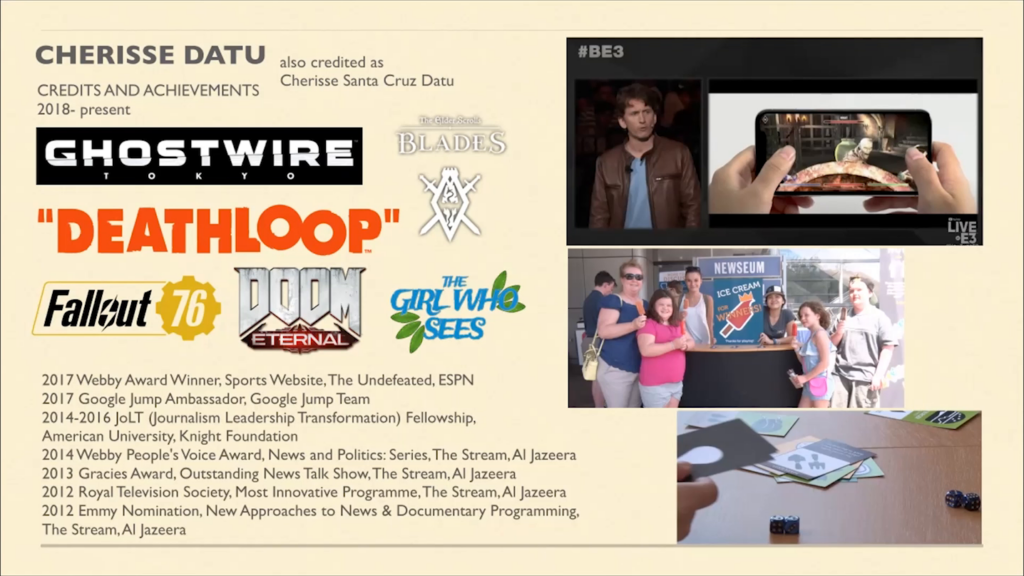
So a little about myself. Who is talking to you right now. So, my name is Cherisse. Thank you so much Golan for the introduction. I’m currently a video producer with Bethesda Softworks. You may have known Bethesda Softworks for their title such as Skyrim, recently came out with Ghostwire Tokyo, then previously Deathloop. I’ve been working with Bethesda Softworks since 2018. I’m sharing this BE3 video from the Blades mobile game. Those are my hands on-screen, so…it’s literally hands-on at work.
Previously I worked with Latoya at ESPN. And before that I was a JoLT Fellow at America University, where we studied the intersection of journalism and game design. And as you see in this Newseum photo, we had like a three-day sort of outside popup at the Newseum in Washington, DC where we invited people to talk about what was the water crisis in California. And they got to play a game and to sort of understand how water resources work. And they also got free popsicles out of it because that’s how we got them to play.
Previously I played around with 360 software, during the time when it was really popular. And then I was at Al Jazeera where I met the lovely Latoya. Worked there for quite a bit, and there’s just a listing of some of the awards that that program won, and it’s still going strong.
To you, Latoya.
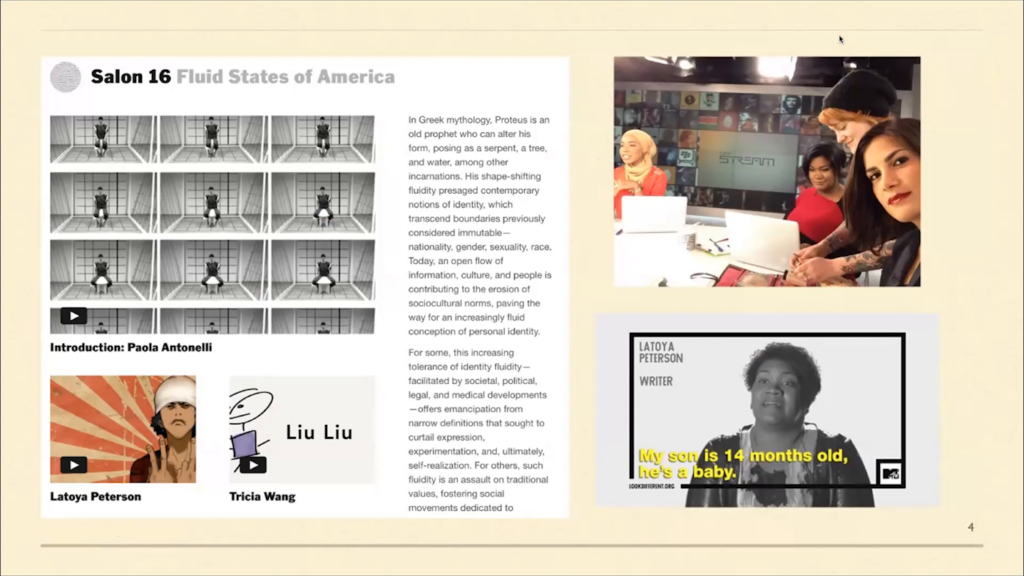
Peterson: Perfect. So I’ve had four or five different careers at this point. I started out, I had a whole kinda pre-Internet career path. Then I was a blogger, and I had a popular site called Racialicious. Which was…you know, big deal back in somewhere between 2008 and 2012 was kind of a our heyday. And we had a collective that was about the intersection of race and pop culture, in which I wrote a lot about video games as part of pop culture, which again was not done.
That led to a lot of hosting gigs, booking gigs, started writing for magazines, writing for newspapers. And guest hosting on what was then Al Jazeera International’s (or Al Jazeera English, specifically’s) version of The Screen. Also was a commentator on various things. You see me there down at the bottom on MTV’s Look Different campaign. And so just talking about different things around race and different anniversaries.
Eventually became as Golan mentioned, one of the executive producers on Al Jazeera America’s The Stream and then got poached out of there to go to Fusion. Got poached out of there to go to ESPN’s The Undefeated, where I rehired Cherisse. Over there at the left is a talk that I gave at the MoMA, which was really cool. so the Fluid States of America.
So my career has been uh…looking at the contours, essentially, of how societies operate, how race functions within those societies. And overall kind of fighting for more justice and more representation for all. Cherisse and I are frequent collaborators, as seen on the next slide, where we are…just about— I think— How many places have we been around the world together. It has been quite a few. So we’re at GEN Summit, which was in Vienna. We collaborated on a documentary about girl gamers for Fusion.
Datu: In ’15, I think. 2015.
Peterson: Yeah. 2015. We’ve done so many things. And then I think this was at EVO one year when we were shooting [inaudible; crosstalk]
Datu: Yes, 2017 EVO.
Peterson: 2017 EVO. And so you know, through the years we’ve definitely collaborated on a lot of projects that have a lot to do with games and different things to do with the culture. And so when the opportunity came up for us to make a game together, both of us now firmly in our post-journalism lives, we were like what better time to do this and particularly around the current events and the landscape of the time.
Datu: And so that all leads us to our project on the Fourth Amendment. And you know what the Fourth Amendment is. It’s the right to be protected from unreasonable search and seizures. And the name “Contempt” came from this idea of all the emotions—especially from the death of Breonna Taylor—a lot of the contempt we felt for how the situation was being treated; contempt of the law, which many people of color are accused of; and just generally we decided that this project would be our own way of coping with the trauma of that time and what does it means to be American, what does it mean to be a person of color.
And so we were inspired by a lot of wonderful things. Latoya, do you want to take this one?
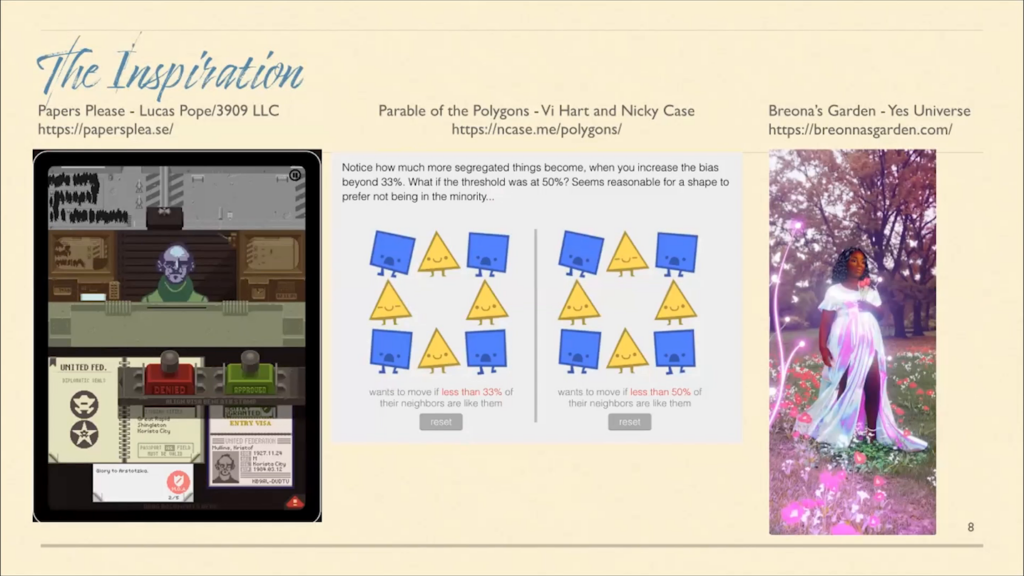
Peterson: Absolutely. And so as lovers of games, as well as game designers, as well as journalists, we love things that kind of bridge the two worlds. So on the left we have Papers Please, which was from—Lucas Pope was the creator. And it’s a game around…being a bureaucrat essentially. It’s a very unusual game. But one of the things it’s about, it’s essentially about resistance and being complicit, particularly in authoritarian regimes. So, wonderful game, won a lot of well-deserved awards.
We also really enjoyed the Parable of the Polygons, which again is more of a playable than a game. But it’s a wonderful exploration of segregation, and how do we get to a society that is so segregated when everybody says “Oh yeah, I don’t need everyone to look like me,” and really being able to play through that bias and understand what is contributing to that type of bias we found very inspiring.
And then finally we have a piece called Breonna’s Garden, which is around Breonna Taylor. The artist Lady Phoenix in this created first an AR and then a VR experience that was created to be a safe space for the activists who were speaking out and trying to hold the police officers who killed Breonna Taylor accountable for what’s happened and they were getting harassed. And so she created this kind of interactive garden experience as a space of healing and as a space to take a breath.
So all of those projects were kind of front of mind as we were thinking about and forming Contempt.
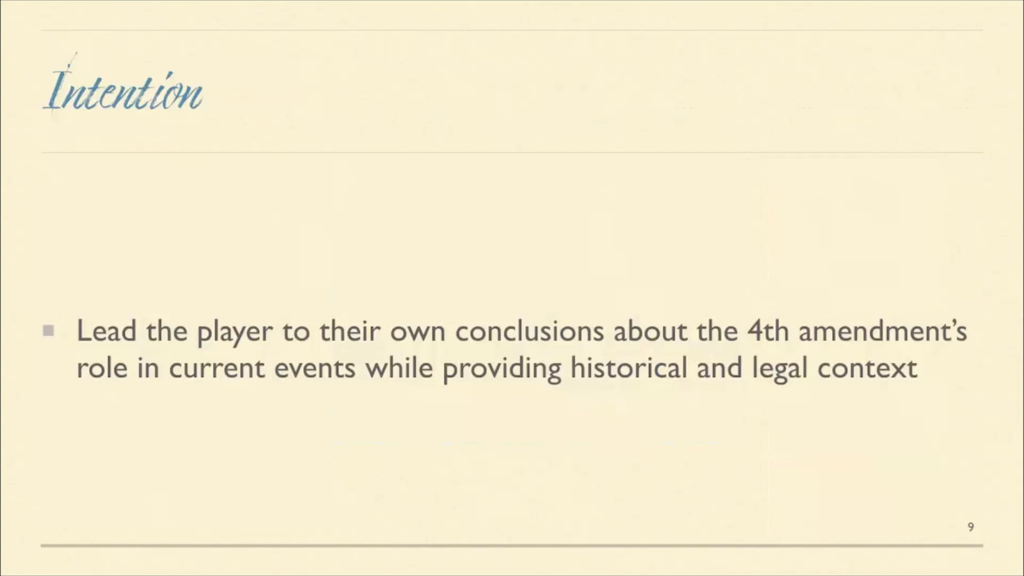
Datu: And so that’s what our intention is behind Contempt, using what Latoya just spoke of. Like vrious forms of inspiration and sort of also our journey to sort of discovering what we thought the Fourth Amendment means and what it actually means.
And so we’re calling Contempt a playable exploration, where through a series of small games, or a playable experience if you really wanna you know, be really strict about what a game is. But the idea of do you know the words of the Fourth Amendment? Do you know that means the right of the people to be secure in their persons, houses, papers? Do you know where probable cause comes from? And then, there’s also an experience where you’re sleeping and you are awoken. And you have to sort of make some choices based on the context you have.
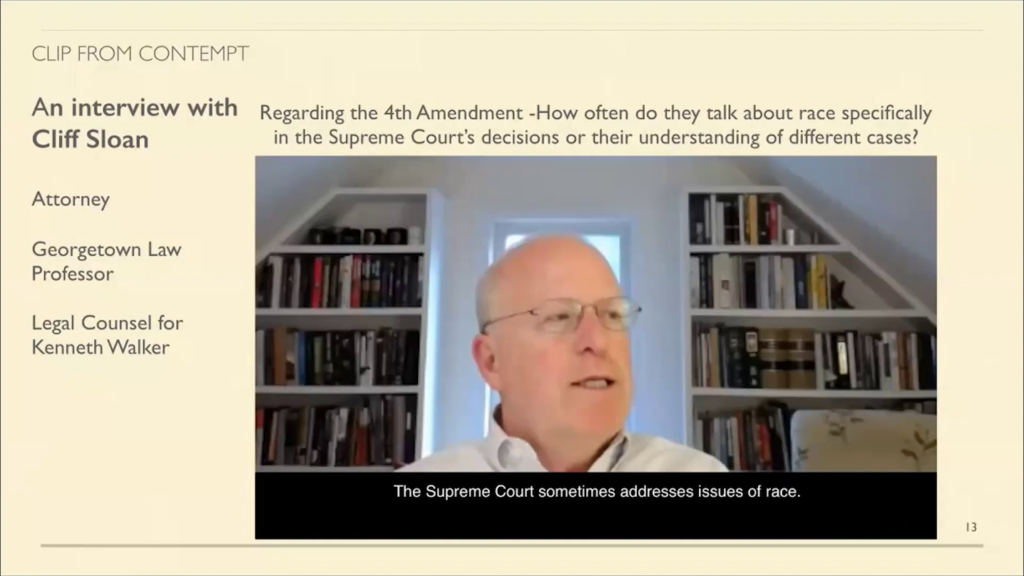
In addition, we went and interviewed some civil rights lawyers. This is professor Cliff Sloan, who was interviewed by Latoya. And he is the legal counsel for Kenneth Walker, his case. And I’m just gonna go ahead and play this clip from his interview.
The Supreme Court sometimes addresses issues of race. But the Supreme Court in the Fourth Amendment context has been very explicit that claims of racial discrimination, for example in police practices, should be brought under the Fourteenth Amendment equal protection guarantee. And the Court has tended to exclude those from consideration under the Fourth Amendment. I have to say I think that’s a very serious mistake. Because the Fourth Amendment protects us against unreasonable searches and seizures. That’s the language of the Fourth Amendment. And if there are police actions in searches or seizures that are based on race, then by definition it’s not a reasonable search or seizure.
Cliff Sloan
And so, during our research in working on this project we found that race is rarely discussed around the Fourth Amendment, despite what Professor Sloan mentioned that a search and seizure based on race is by definition unreasonable. So that leads to a question that we’re trying to answer.
Peterson: Right, with Contempt and actually really to provoke thought into the audience. Because most people don’t think about their amendment rights on a regular basis. It’s only generally when you need them that people start to think about them deeply. And with all we’ve known and all we’ve learned, and hopefully what people learn playing through the experience, is the question is do we believe the Fourth Amendment is still effective, considering current events? And you know, the focus of our project is race, specifically. And looking through the lens of race around search and seizure, and unlawful conduct particularly by the police.
But there’s also a second element to this, which is also digital rights. And so we really want folks to be able to reflect on the fullness of the Fourth Amendment, even though we are focused on race for this project. And to think about what does it mean if the courts, if you the structures that we set up to protect us based on the Constitution, are taking such a narrow view that the Fourth Amendment is ultimately ineffective.
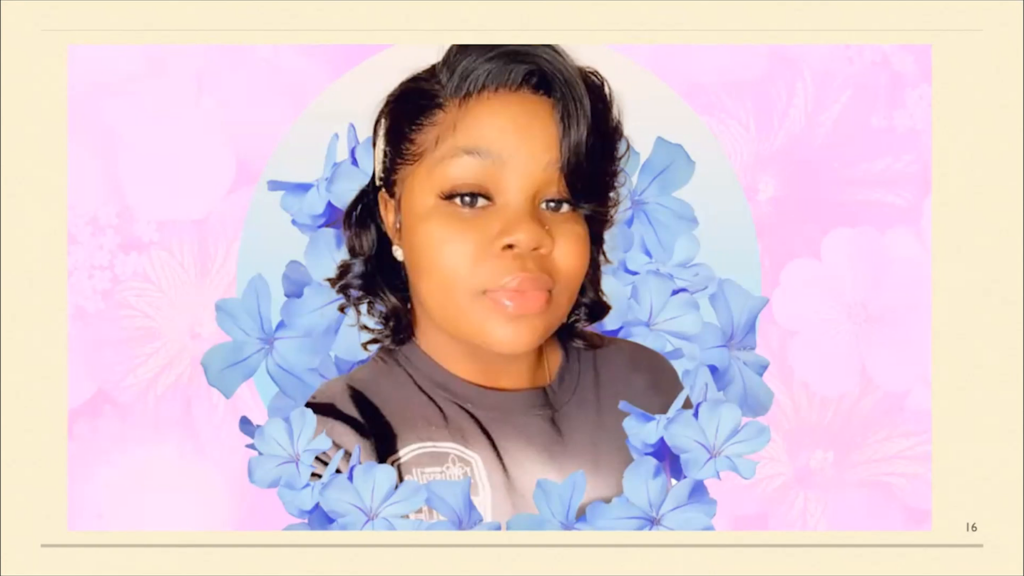
Datu: And then, we’d like to also sort of dedicate this project to Breonna Taylor and many of the people like her, who still are looking for justice today.
Peterson: Yeah, Breonna Taylor is unfortunately one of many many folks who have been surfaced who…should have cases under the Fourth Amendment. And since she was killed I think there have been forty-four cases brought to the Supreme Court—that’s just counting the ones that made it to the court docket, not all the ones that’ve been filed, or things in circuit court. There’s been forty-four additional cases since then, since March of 2020. And even with that, if Professor Sloan is able to bring Kenneth Walker’s case before the Fourth Amendment, we probably won’t see that reflected for a few years. So we really wanted to take space at the end of the project to honor all the folks who should’ve been protected by this amendment and who have not been.
Datu: Thank you for listening.
